September 16, 2020
The Smallest Lights in the Universe, by Sara Seager
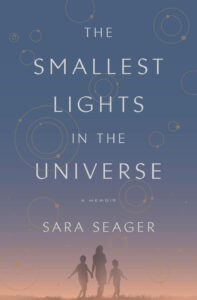
Space made news this week with the discovery of possible life on Venus, and what was most exciting for me about this development was that on the team of researchers who’d made this discovery was Dr. Sara Seager, MIT Astrophysicist and author of Smallest Lights in the Universe, which I was reading last week. Can you imagine discovering alien lifeforms and releasing an emotionally powerful memoir all in the same season?
But then Sara Seager doesn’t do anything in an ordinary fashion, as the reader discovers. She write about her unconventional childhood growing up in Toronto, how her passion for astronomy grew, how she found her way to marriage and family, and how she endured the loss of her husband, who had kept their domestic life afloat while Seager had her head in the outer-reaches of space, developing theories of exoplanets that had seemed like fiction when she began her work in the 1990s. She writes too about her recent diagnosis on the autism spectrum, and her singular point of view in this regard is what makes her memoir so fascinating. When her first husband was interested in her, she writes, she initially rejected his advances, because she just wasn’t that into people, and her strongest feeling toward her fellow humans was “tolerance. I also loved the straightforwardness with which she writes about motherhood, which she was never ambivalent about, but which was hard to balance with a busy career, and even moreso after she became a solo parent. These kinds of ideas have been expressed so many times, but Seager manages to do so devoid of the usual cliches and with a fresh and interesting perspective. Further, her quest to learn what can be discovered in the outer reaches of the universe, her belief in other possibilities, in different worlds, is the kind of perspective than seems urgently necessary now, when we need curiosity and imagination more than ever.
October 26, 2014
Would-Be Pickler Tries Nathan’s Famous
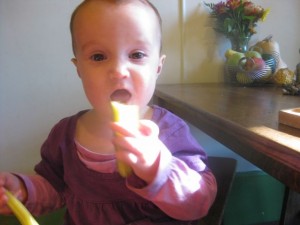 In my blogging course last Monday, we were talking about blog titles, and I conceded that there was probably an expert out there who—for SEO purposes and issues of general confusion—would advise you not to call your book blog Pickle Me This. But the problem with expert advice (and why expert advice so often doesn’t work for blogs, which are characterized by their refusal to conform to expectations) is that such advice cannot take into account the forces of serendipity.
In my blogging course last Monday, we were talking about blog titles, and I conceded that there was probably an expert out there who—for SEO purposes and issues of general confusion—would advise you not to call your book blog Pickle Me This. But the problem with expert advice (and why expert advice so often doesn’t work for blogs, which are characterized by their refusal to conform to expectations) is that such advice cannot take into account the forces of serendipity.
For example: You christen your blog “Pickle Me This” for no good reason in 2004, thereby enabling a delivery of actual pickles to land on your doorstep a decade later.
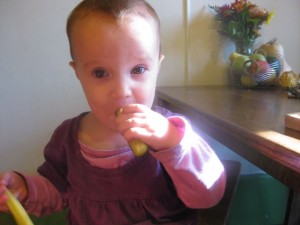 Except that there was a reason I named my blog Pickle Me This. Not a good one, but still.
Except that there was a reason I named my blog Pickle Me This. Not a good one, but still.
In 2004, I lived in Japan teaching English conversation to students with whom I usually had very little in common. This lack of commonality made our English conversation challenging. “What is your hobby?” became a conversation touchstone when all else had failed, mostly because the Japanese school system mandated that every student have a hobby. (Those students who were bad at everything usually ended up on sports teams charged with carrying equipment.) Bored housewives were also hobby connoisseurs, with interests including tea ceremonies, ikebana, and calligraphy, though more often than not, their answer to the hobbies question was “learning English,” which brought us full (albeit very small) circle, and made the minutes on our classroom clock tick by oh-so slowly.
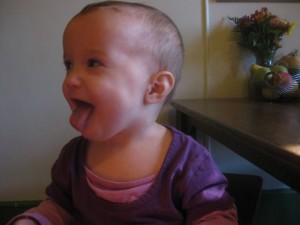 Living in Japan does something to the brain. To this day, all my favourite music is basically assembled from karaoke playlists, I was photographing my lunch before it was cool, and I’m still inclined to squeal, “Kawaii!” when the situation warrants it. Part of becoming “Japanified” was responding the experience of living abroad and discovering how wide the world was, all the while we were cut off from the culture around us by being foreigners. We forgot how to form proper sentences, how to behave, and partook in strange pursuits to the fill the gaps that had appeared in our lives now that they were being conducted so far from home.
Living in Japan does something to the brain. To this day, all my favourite music is basically assembled from karaoke playlists, I was photographing my lunch before it was cool, and I’m still inclined to squeal, “Kawaii!” when the situation warrants it. Part of becoming “Japanified” was responding the experience of living abroad and discovering how wide the world was, all the while we were cut off from the culture around us by being foreigners. We forgot how to form proper sentences, how to behave, and partook in strange pursuits to the fill the gaps that had appeared in our lives now that they were being conducted so far from home.
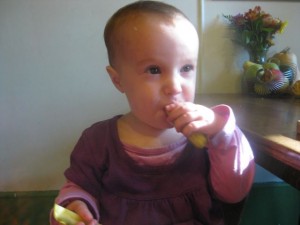 In 2004, I decided that I would learn how to pickle. This would be the beginning of something huge, I imagined. In Japan, anything was possible. I was picturing a sizeable cottage industry, adorable labels. They would say, “Pickle Me This,” the name of my company. One of my students—an avid pickler—wanted to support my ambitions and went as far as to give me a gift of pickling spice she’d made herself. “I want you to be a pickle success!” she told me.
In 2004, I decided that I would learn how to pickle. This would be the beginning of something huge, I imagined. In Japan, anything was possible. I was picturing a sizeable cottage industry, adorable labels. They would say, “Pickle Me This,” the name of my company. One of my students—an avid pickler—wanted to support my ambitions and went as far as to give me a gift of pickling spice she’d made herself. “I want you to be a pickle success!” she told me.
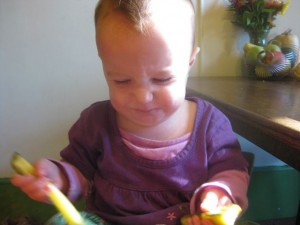 Except that I was a pickling disaster. Granted, a lot was working against me. My entire kitchen was a hot plate, and I didn’t own a measuring cup. I was illiterate, so could not read food labels to know what kind of vinegar I was employing for my pickling task (if it was vinegar at all). I had no culinary skills then, and struggled with following simple recipes, whose advice, I decided, was usually just a helpful suggestion, as I slung a fistful of something or other into my pot. In Japan, we ate spaghetti sauce that came out of pouches, and I thought that was just fine. So the precision involved in pickling was well beyond my ken.
Except that I was a pickling disaster. Granted, a lot was working against me. My entire kitchen was a hot plate, and I didn’t own a measuring cup. I was illiterate, so could not read food labels to know what kind of vinegar I was employing for my pickling task (if it was vinegar at all). I had no culinary skills then, and struggled with following simple recipes, whose advice, I decided, was usually just a helpful suggestion, as I slung a fistful of something or other into my pot. In Japan, we ate spaghetti sauce that came out of pouches, and I thought that was just fine. So the precision involved in pickling was well beyond my ken.
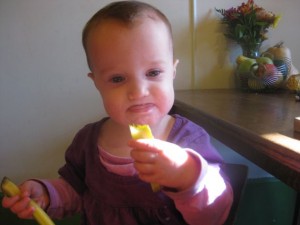 You can actually track the trajectory of my very short pickling career, which began with a blog post called “Are Pickles Supposed to Float?” and proceeded on to a post called “Dubious Pickles” the very next day, reporting that the pickles were shrivelling up in their jar. I don’t remember what happened to the pickles after that, but it is quite possible that I insisted on eating them even though they were vile and probably laced with botulism. I have a hard time admitting when my plans have gone wrong. I am a specialist in Stubborn as You Like. But I never made pickles again.
You can actually track the trajectory of my very short pickling career, which began with a blog post called “Are Pickles Supposed to Float?” and proceeded on to a post called “Dubious Pickles” the very next day, reporting that the pickles were shrivelling up in their jar. I don’t remember what happened to the pickles after that, but it is quite possible that I insisted on eating them even though they were vile and probably laced with botulism. I have a hard time admitting when my plans have gone wrong. I am a specialist in Stubborn as You Like. But I never made pickles again.
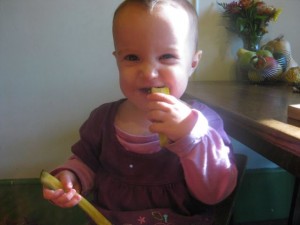 I’ve called myself a “would-be pickler” in the years since, usually in the bio on the blog that was christened Pickle Me This not long after my failed venture. This blog as been much more successful than the pickles, proving that you can’t win ’em all, but also that just because you lose some doesn’t mean it’s all lost. I was always going to be a better blogger than a pickler anyway. Accepting being so far from perfect is probably one reason I’ve been able to do so well as a blogger too, the pickles were certainly a fundamental lesson in that respect.
I’ve called myself a “would-be pickler” in the years since, usually in the bio on the blog that was christened Pickle Me This not long after my failed venture. This blog as been much more successful than the pickles, proving that you can’t win ’em all, but also that just because you lose some doesn’t mean it’s all lost. I was always going to be a better blogger than a pickler anyway. Accepting being so far from perfect is probably one reason I’ve been able to do so well as a blogger too, the pickles were certainly a fundamental lesson in that respect.
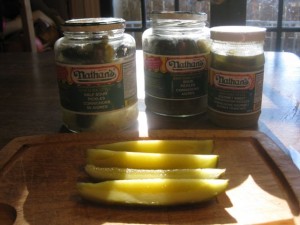 One consolation of failed pickledom is that it doesn’t keep one from eating pickles. Another consolation of failed pickledom is actual pickles on the doorstep from Nathan’s Famous, which are launching in Canada and are available in the refrigerated meat cooler sections at No Frills, Loblaws, and other grocery stores. Because a blog called Pickle Me This comes out on top when PR firms are searching for Canadian blogs about pickles. Perhaps this was part of my plan all along?
One consolation of failed pickledom is that it doesn’t keep one from eating pickles. Another consolation of failed pickledom is actual pickles on the doorstep from Nathan’s Famous, which are launching in Canada and are available in the refrigerated meat cooler sections at No Frills, Loblaws, and other grocery stores. Because a blog called Pickle Me This comes out on top when PR firms are searching for Canadian blogs about pickles. Perhaps this was part of my plan all along?
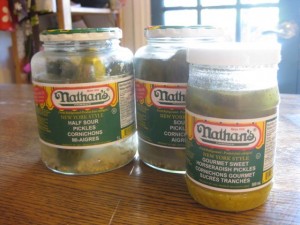 So we’ve been eating pickles all weekend, revelling in the bounty. I’m a bit crazy about the sweet horseradish pickles, though it’s possible I never met a sweet pickle I didn’t like. The sour and half sour are huge and full of crunch and flavour. Iris insists on eating them too, even though she makes the most ridiculous faces while doing so, but she keeps coming back for another bite, and so do I, because they’re good pickles.
So we’ve been eating pickles all weekend, revelling in the bounty. I’m a bit crazy about the sweet horseradish pickles, though it’s possible I never met a sweet pickle I didn’t like. The sour and half sour are huge and full of crunch and flavour. Iris insists on eating them too, even though she makes the most ridiculous faces while doing so, but she keeps coming back for another bite, and so do I, because they’re good pickles.
And maybe you have to have been responsible for bad pickles to do know how precious a good pickle really is.
(Thanks to the people at Foodfest America for making my pickle dreams come true.)





